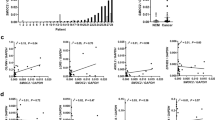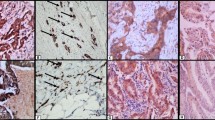Abstract
The presence of KRAS mutation enhances the stem cell features of colorectal carcinoma cells containing mutant adenomatous polyposis coli (APC). However, their potential role in small intestinal adenocarcinoma remains elusive. Here, we aimed to investigate the clinical significance of cancer stem cell markers expression in the context of small intestinal adenocarcinoma with the KRAS genotype. SOX2, NANOG, and OCT4 expression were assessed by immunohistochemistry and digital image analysis, and their potential association with KRAS was further examined in 185 Korean patients with small intestinal adenocarcinomas, which were collected from 22 institutions in South Korea. Positive expression of SOX2, NANOG, and OCT4 was detected in 65 (35.1%), 94 (50.8%), and 82 (44.3%) of patients, respectively. Patients with high SOX2 (SOX2+) expression displayed worse overall survival compared to those with low SOX2 (SOX2−) expression (P < 0.001). Patients with SOX2+/mutant KRAS (KRASMT) (11.1 months) had significantly shorter overall survival than those with SOX2−/KRASWT (53.6 months) (P < 0.001). In multivariate analysis, SOX2+, distal location, high pT and pN categories, microsatellite stable, and absence of predisposing diseases were independent prognostic factors for worse overall survival. These results suggest that SOX2 expression has the potential to predict clinical outcomes in patients with small intestinal adenocarcinomas.





Similar content being viewed by others
References
Agrawal S, McCarron EC, Gibbs JF, Nava HR, Wilding GE, Rajput A (2007) Surgical management and outcome in primary adenocarcinoma of the small bowel. Ann Surg Oncol 14(8):2263–2269. https://doi.org/10.1245/s10434-007-9428-2
Akce M, Jiang R, Zakka K, Wu C, Alese OB, Shaib WL, Behera M, El-Rayes BF (2019) Clinical outcomes of small bowel adenocarcinoma. Clin Colorectal Cancer 18(4):257–268. https://doi.org/10.1016/j.clcc.2019.08.002
Aparicio T, Henriques J, Manfredi S, Tougeron D, Bouche O, Pezet D, Piessen G, Coriat R, Zaanan A, Legoux JL, Terrebone E, Pocard M, Gornet JM, Lecomte T, Lombard-Bohas C, Perrier H, Lecaille C, Lavau-Denes S, Vernerey D, Afchain P, Investigators N (2020) Small bowel adenocarcinoma: results from a nationwide prospective ARCAD-NADEGE cohort study of 347 patients. Int J Cancer 147(4):967–977. https://doi.org/10.1002/ijc.32860
Basu-Roy U, Seo E, Ramanathapuram L, Rapp TB, Perry JA, Orkin SH, Mansukhani A, Basilico C (2012) Sox2 maintains self-renewal of tumor-initiating cells in osteosarcomas. Oncogene 31(18):2270–2282. https://doi.org/10.1038/onc.2011.405
Batlle E, Clevers H (2017) Cancer stem cells revisited. Nat Med 23(10):1124–1134. https://doi.org/10.1038/nm.4409
WHO Classification of Tumors Editorial Board (2019) Digestive system tumors. In: Nagtegaal ID, Arends MJ, Salto-Tellez M (eds) Colorectal adenocarcinoma, 5th edn. International Agency for Research on Cancer, Lyon, pp 177–187
Chang HK, Yu E, Kim J, Bae YK, Jang KT, Jung ES, Yoon GS, Kim JM, Oh YH, Bae HI, Kim GI, Jung SJ, Gu MJ, Kim JY, Jang KY, Jun SY, Eom DW, Kwon KW, Kang GH, Park JB, Hong S, Lee JS, Park JY, Hong SM, Korean Small Intestinal Cancer Study G (2010) Adenocarcinoma of the small intestine: a multi-institutional study of 197 surgically resected cases. Hum Pathol 41(8):1087–1096. https://doi.org/10.1016/j.humpath.2010.01.006
Dai X, Ge J, Wang X, Qian X, Zhang C, Li X (2013) OCT4 regulates epithelial-mesenchymal transition and its knockdown inhibits colorectal cancer cell migration and invasion. Oncol Rep 29(1):155–160. https://doi.org/10.3892/or.2012.2086
Desai A, Yan Y, Gerson SL (2019) Concise reviews: cancer stem cell targeted therapies: toward clinical success. Stem Cells Transl Med 8(1):75–81. https://doi.org/10.1002/sctm.18-0123
Gawlik-Rzemieniewska N, Bednarek I (2016) The role of NANOG transcriptional factor in the development of malignant phenotype of cancer cells. Cancer Biol Ther 17(1):1–10. https://doi.org/10.1080/15384047.2015.1121348
Hadjimichael C, Chanoumidou K, Papadopoulou N, Arampatzi P, Papamatheakis J, Kretsovali A (2015) Common stemness regulators of embryonic and cancer stem cells. World J Stem Cells 7(9):1150–1184. https://doi.org/10.4252/wjsc.v7.i9.1150
Halfdanarson TR, McWilliams RR, Donohue JH, Quevedo JF (2010) A single-institution experience with 491 cases of small bowel adenocarcinoma. Am J Surg 199(6):797–803. https://doi.org/10.1016/j.amjsurg.2009.05.037
Herreros-Villanueva M, Zhang JS, Koenig A, Abel EV, Smyrk TC, Bamlet WR, de Narvajas AA, Gomez TS, Simeone DM, Bujanda L, Billadeau DD (2013) SOX2 promotes dedifferentiation and imparts stem cell-like features to pancreatic cancer cells. Oncogenesis 2:e61. https://doi.org/10.1038/oncsis.2013.23
Hong SH, Koh YH, Rho SY, Byun JH, Oh ST, Im KW, Kim EK, Chang SK (2009) Primary adenocarcinoma of the small intestine: presentation, prognostic factors and clinical outcome. Jpn J Clin Oncol 39(1):54–61. https://doi.org/10.1093/jjco/hyn122
Jeong WJ, Yoon J, Park JC, Lee SH, Lee SH, Kaduwal S, Kim H, Yoon JB, Choi KY (2012) Ras stabilization through aberrant activation of Wnt/beta-catenin signaling promotes intestinal tumorigenesis. Sci Signal 5(219):ra30. https://doi.org/10.1126/scisignal.2002242
Jun SY, Kim M, Gu MJ, Bae YK, Chang HK, Jung ES, Jang KT, Kim J, Yu E, Eom DW, Hong SM (2016) Clinicopathologic and prognostic associations of KRAS and BRAF mutations in small intestinal adenocarcinoma. Mod Pathol 29(4):402–415. https://doi.org/10.1038/modpathol.2016.40
Jun SY, Lee EJ, Kim MJ, Chun SM, Bae YK, Hong SU, Choi J, Kim JM, Jang KT, Kim JY, Kim GI, Jung SJ, Yoon G, Hong SM (2017) Lynch syndrome-related small intestinal adenocarcinomas. Oncotarget 8(13):21483–21500. https://doi.org/10.18632/oncotarget.15277
Jun SY, Park ES, Lee JJ, Chang HK, Jung ES, Oh YH, Hong SM (2020) Prognostic significance of stromal and intraepithelial tumor-infiltrating lymphocytes in small intestinal adenocarcinoma. Am J Clin Pathol 153(1):105–118. https://doi.org/10.1093/ajcp/aqz136
Koo BS, Lee SH, Kim JM, Huang S, Kim SH, Rho YS, Bae WJ, Kang HJ, Kim YS, Moon JH, Lim YC (2015) Oct4 is a critical regulator of stemness in head and neck squamous carcinoma cells. Oncogene 34(18):2317–2324. https://doi.org/10.1038/onc.2014.174
Lee HJ, Lee OJ, Jang KT, Bae YK, Chung JY, Eom DW, Kim JM, Yu E, Hong SM (2013) Combined loss of E-cadherin and aberrant beta-catenin protein expression correlates with a poor prognosis for small intestinal adenocarcinomas. Am J Clin Pathol 139(2):167–176. https://doi.org/10.1309/ajcps54rtfcthgwx
Lundberg IV, Lofgren Burstrom A, Edin S, Eklof V, Oberg A, Stenling R, Palmqvist R, Wikberg ML (2014) SOX2 expression is regulated by BRAF and contributes to poor patient prognosis in colorectal cancer. PLoS One 9(7):e101957. https://doi.org/10.1371/journal.pone.0101957
Lytle NK, Barber AG, Reya T (2018) Stem cell fate in cancer growth, progression and therapy resistance. Nat Rev Cancer 18(11):669–680. https://doi.org/10.1038/s41568-018-0056-x
Meng HM, Zheng P, Wang XY, Liu C, Sui HM, Wu SJ, Zhou J, Ding YQ, Li J (2010) Over-expression of Nanog predicts tumor progression and poor prognosis in colorectal cancer. Cancer Biol Ther 9(4):295–302. https://doi.org/10.4161/cbt.9.4.10666
Moon BS, Jeong WJ, Park J, Kim TI, do Min S, Choi KY (2014) Role of oncogenic K-Ras in cancer stem cell activation by aberrant Wnt/beta-catenin signaling. J Natl Cancer Inst 106(2):djt373. https://doi.org/10.1093/jnci/djt373
Nash GM, Gimbel M, Shia J, Nathanson DR, Ndubuisi MI, Zeng ZS, Kemeny N, Paty PB (2010) KRAS mutation correlates with accelerated metastatic progression in patients with colorectal liver metastases. Ann Surg Oncol 17(2):572–578. https://doi.org/10.1245/s10434-009-0605-3
Neumann J, Bahr F, Horst D, Kriegl L, Engel J, Luque RM, Gerhard M, Kirchner T, Jung A (2011) SOX2 expression correlates with lymph-node metastases and distant spread in right-sided colon cancer. BMC Cancer 11:518. https://doi.org/10.1186/1471-2407-11-518
Niwa H (2011) Wnt: what’s needed to maintain pluripotency? Nat Cell Biol 13(9):1024–1026. https://doi.org/10.1038/ncb2333
Putzer BM, Solanki M, Herchenroder O (2017) Advances in cancer stem cell targeting: how to strike the evil at its root. Adv Drug Deliv Rev 120:89–107. https://doi.org/10.1016/j.addr.2017.07.013
Raghav K, Overman MJ (2013) Small bowel adenocarcinomas--existing evidence and evolving paradigms. Nat Rev Clin Oncol 10(9):534–544. https://doi.org/10.1038/nrclinonc.2013.132
Rodrigo JP, Villaronga MA, Menendez ST, Hermida-Prado F, Quer M, Vilaseca I, Allonca E, Pedregal Mallo D, Astudillo A, Garcia-Pedrero JM (2017) A novel role for Nanog as an early cancer risk marker in patients with laryngeal precancerous lesions. Sci Rep 7(1):11110. https://doi.org/10.1038/s41598-017-11709-9
Schrock AB, Devoe CE, McWilliams R, Sun J, Aparicio T, Stephens PJ, Ross JS, Wilson R, Miller VA, Ali SM, Overman MJ (2017) Genomic profiling of small-bowel adenocarcinoma. JAMA Oncol 3(11):1546–1553. https://doi.org/10.1001/jamaoncol.2017.1051
Siegel RL, Miller KD, Jemal A (2019) Cancer statistics, 2019. CA Cancer J Clin 69(1):7–34. https://doi.org/10.3322/caac.21551
Takahashi K, Yamanaka S (2006) Induction of pluripotent stem cells from mouse embryonic and adult fibroblast cultures by defined factors. Cell 126(4):663–676. https://doi.org/10.1016/j.cell.2006.07.024
Visvader JE, Lindeman GJ (2008) Cancer stem cells in solid tumours: accumulating evidence and unresolved questions. Nat Rev Cancer 8(10):755–768. https://doi.org/10.1038/nrc2499
Wang X, Dai J (2010) Concise review: isoforms of OCT4 contribute to the confusing diversity in stem cell biology. Stem Cells 28(5):885–893. https://doi.org/10.1002/stem.419
Wen K, Fu Z, Wu X, Feng J, Chen W, Qian J (2013) Oct-4 is required for an antiapoptotic behavior of chemoresistant colorectal cancer cells enriched for cancer stem cells: effects associated with STAT3/Survivin. Cancer Lett 333(1):56–65. https://doi.org/10.1016/j.canlet.2013.01.009
Wu TJ, Yeh CN, Chao TC, Jan YY, Chen MF (2006) Prognostic factors of primary small bowel adenocarcinoma: univariate and multivariate analysis. World J Surg 30(3):391–399. https://doi.org/10.1007/s00268-005-7898-6
Xu F, Dai C, Zhang R, Zhao Y, Peng S, Jia C (2012) Nanog: a potential biomarker for liver metastasis of colorectal cancer. Dig Dis Sci 57(9):2340–2346. https://doi.org/10.1007/s10620-012-2182-8
Acknowledgments
We would like to thank the members of the Korean Small Intestinal Cancer Study Group: Dr. Eun Sun Jung, The Catholic University of Korea College of Medicine, Seoul; Dr. Young Kyung Bae, Yeungnam University College of Medicine, Daegu; Dr. Joon Mee Kim, Inha University College of Medicine, Incheon; Dr. Gwang Il Kim, CHA Bundang Medical Center, CHA University, Seongnam; Dr. Kee-Taek Jang, Samsung Medical Center, Sungkyunkwan University School of Medicine, Seoul; Dr. Jung Yeon Kim, Inje University Sanggye Paik Hospital, Seoul; Dr. Soo Jin Jung, Inje University College of Medicine, Busan; Dr. Ghilsuk Yoon, Kyungpook National University School of Medicine, Daegu; Dr. Kyu Yun Jang, Chonbuk National University Medical School, Jeonju; Dr. Jinwon Seo, Hallym University Sacred Heart Hospital, Anyang; Dr. Tae Jung Kim, Yeouido St. Mary’s Hospital, College of Medicine, The Catholic University of Korea, Seoul; Dr. Eun Kyoung Kwak, Fatima Hospital, Daegu; Dr. Dae Woon Eom, University of Ulsan College of Medicine, Gangneung Asan Hospital, Gangneung; Dr. Hee Kyung Kim, Soonchunhyang University Bucheon Hospital, Bucheon; Dr. Hee Sung Park, Gangnam Severance Hospital, Yonsei University College of Medicine, Seoul; and Dr. Ji Shin Lee, Chonnam National University Medical School, Gwangju, Korea.
Funding
This study was supported in part by the Intramural Research Program of the NIH, National Cancer Institute, Center for Cancer Research, and the Basic Science Research Program, through the National Research Foundation of Korea (NRF), funded by the Ministry of Education, Science and Technology (2017R1D1A1B03031817, awarded to S.-Y. J.).
Author information
Authors and Affiliations
Contributions
JWK, J-YC, S-MH, and SMH designed the study. JWK, J-YC, KY, and YP collected the data and analyzed the data. JWK and J-YC drafted and edited the manuscript. S-YJ, S-MH, and SMH reviewed and edited the manuscript.
Corresponding authors
Ethics declarations
Conflict of interest
The authors declare that they have no conflict of interest.
Ethics approval
This retrospective study was approved by the institutional review board of Incheon St. Mary’s Hospital (OC14OIMI0133), and patients’ informed consent was waived by the ethics committee.
Additional information
Publisher’s note
Springer Nature remains neutral with regard to jurisdictional claims in published maps and institutional affiliations.
Rights and permissions
About this article
Cite this article
Kim, J.W., Chung, JY., Ylaya, K. et al. Prognostic implication of SOX2 expression in small intestinal adenocarcinoma. Virchows Arch 478, 1049–1060 (2021). https://doi.org/10.1007/s00428-020-02946-x
Received:
Revised:
Accepted:
Published:
Issue Date:
DOI: https://doi.org/10.1007/s00428-020-02946-x




